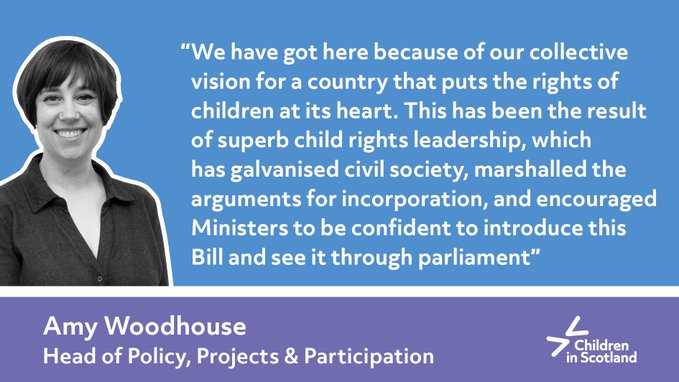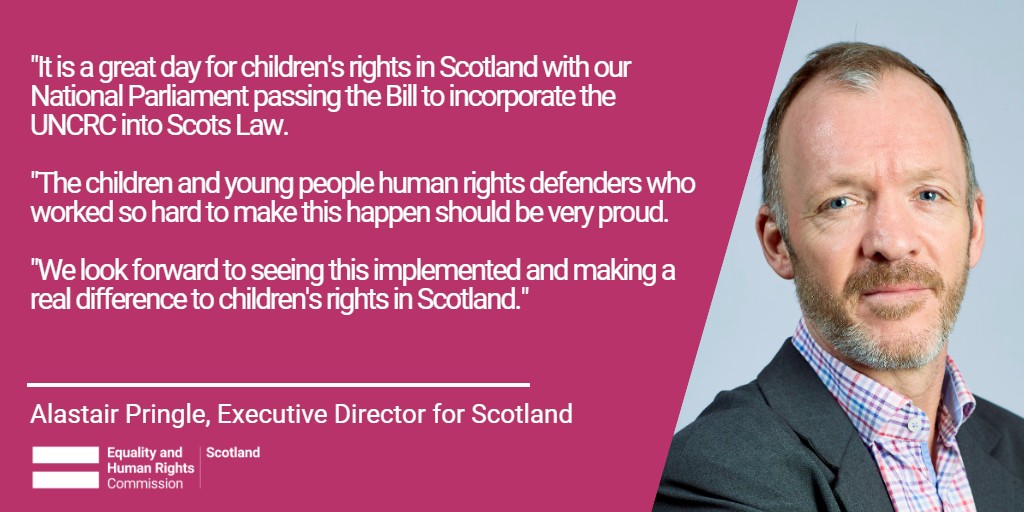Wean’s World
Holyrood incorporates the UN Convention on the Rights of the Child (UNCRC) into Scots Law
On the day Westminster was passing the Police, Crime, Sentencing & Courts Bill, Holyrood was incorporating the UN Convention on the Rights of the Child (UNCRC) into Scots Law. It applies to everyone under the age of 18. Its aim is “to recognise the rights of children and ensure that they grow up in the spirit of peace, dignity, tolerance, freedom, equality and solidarity.”
On Wednesday we became the first part of the UK to vote to enshrine the UNCRC into domestic law. This is a significant moment, a historic moment and an important development for Scottish democracy. Away from the froth and fury of constitutional politics here is a different form of struggle, NGOs and third sector Scotland collaborating to improve life for, in this case, our children.
Amy Woodhouse from Children in Scotland said: “… an exciting thing about today is that we have got here because of our collective vision for a country that puts the rights of children at its heart. This has been the result of superb child rights leadership over many years, which has galvanised and motivated civil society, marshalled the arguments for incorporation, dealt with any concerns and encouraged Scottish Ministers to be confident enough to introduce this Bill and see it through parliament.
I’m hesitant to list individuals for fear of missing anyone, but we should take time to acknowledge the role of Together (the Scottish Alliance for Children’s Rights), the Children and Young People’s Commissioner Scotland, Scottish Youth Parliament and Children’s Parliament in particular for their unfailing commitment to driving this agenda forward and placing children and young people’s voices at the centre of their campaigning.”

Bruce Adamson, the Childrens Commissioner, warned the government and decision-makers that there is now no hiding place when it comes to upholding children’s rights.
He said: “Incorporating the UNCRC into Scots law is the most important thing we can do to protect and promote the rights of children and young people. People in power can no longer ignore or conveniently forget about children’s rights. If they do, children and young people can challenge and will have a meaningful system of redress when things go wrong.”
“There’s no question this will improve life for all children, but those who will feel the biggest impact are children whose rights are most at risk – children living in poverty, disabled children, young carers, those who have experience of the care system, children from black and minority ethnic backgrounds. Their rights will be at the centre of every policy, law, or budgetary decision from now on. This will lead to significant change in things like addressing poverty and supporting mental health which children themselves have identified as priorities. It will also mean better support for families.”
“This law gives children power – they will be consulted and listened to. Children and young people, as well as other campaigners, have fought tirelessly for incorporation for many decades, and today is testament to their determination. The government and decision-makers should know that all eyes are on them and children won’t hesitate to hold them to account.”

This is a gain like any significant human rights and equality measure over time. A rights-based approach only flourishes with enforcement and a wider culture of protection and ambition, but this is a significant victory for our children and our democracy.
Children in Scotland’s Head of Policy, Projects & Participation Amy Woodhouse has said: “I’m conscious that child rights advocates often describe the UNCRC as the floor rather than the ceiling. It provides the foundations on which to build a much more ambitious vision. And as a country Scotland will continue to be ambitious in this area, you can bet on it. The work is not done. However, good foundations are absolutely essential all the same. Fundamental even. Today may not be the topping out ceremony, but we can see the shape of the building now, and that is exciting, motivating – and, yes, historic.”
What rights do children have under the UNCRC?
Every child has 40 specific rights under the Convention. These rights can be divided into several categories:
- Right to life, survival and development;
- Right to non-discrimination;
- Right to express views freely;
- Right to have a child’s best interests taken as a primary consideration in all matters affecting them.
Civic Rights and Freedoms
- Right to a name and nationality
- Freedom of expression
- Freedom of thought and association
- Access to information
- Right not to be tortured or ill-treated
Violence Against Children
- protection from violence, abuse and neglect
- abolishing traditional practices prejudicial to the health of children
- school discipline
- protection from all forms of sexual exploitation
- protection from inhuman or degrading treatment
- recovery from trauma and reintegration
Family Environment
- Right to live with and have contact with both parents
- Right to be reunited with parents if separated from them
- Right to appropriate alternative care where necessary
Basic Health and Welfare
- Rights of disabled children
- Right to health and health care
- Right to social security
- Right to child care services
- Right to an adequate standard of living
Education, Leisure and Culture
- Right to education
- Right to play
- Right to leisure and to participate in cultural life and the arts
Special Protection Measures
- Rights of refugee children
- Rights of children affected by armed conflicts
- Rights of children in the juvenile justice system
- Rights of children deprived of their liberty
- Rights of children suffering exploitation

How come, I did not see anything about this on BBC Scotland or STV or read about it in the Herald, Scotsman, Courier, P&J, Daily Ranger (well of course, it must be excused because the teddies are champeens – trivial things like the UNCRC – and fans were right to celebrate in George Square.)?
Are you still expecting to see news about Scotland or Scottish matters reported by the British Broadcasting Corporation — the one we Scots also pay our licence fees/taxes for? I didn’t know such charming naivety still existed!
When I lived in England, with no access to Scottish media I knew — frustratingly — almost nothing about anything happening up here. It was only when I came back up to visit family I could tell Scotland hadn’t become a sort of large-scale Brigadoon, only coming to active life every hundred days or so when something ‘important’ happened up here (such as a Cabinet Minister making a brief dash up here to pretend he cared and get a photo op, and then back down again as fast as his First Class carriage and ministerial car could carry him) but was actually still a vibrant nation running much of its own affairs full of lively people doing interesting and important things that would have been all over the London-based news media had any of this happened within commuting distance of Central London. But, of course, if something ‘only’ happened in the Central Belt it was dismissed as not being of interest to people outwith Scotland, oddly unlike the parallel assumption that yet another drug-gang murder in London must be of fascinated interest to the inhabitants of Largs or Linlithgow.
I know some people are disappointed in The Nine — and it’s far from perfect or absent from the Unionist bias that bedevils BBC Scotland — but after (too many) years in the flatlands of England I, at least, am glad finally to be able to watch news, both national and international, being edited, delivered and discussed in Scotland.
But we need more and better, starting with the London-based BBC giving up thinking it’s done what’s required by giving the moaning Scots their own little news programme and starting, finally, to get its collective head round the notion that (roughly) 1 in 10 of its customers live in Scotland, with another large percentage of Scots-born people living elsewhere in the U.K., all of whom deserve a minimum of 10% of U.K. broadcast national news stories to cover news about Scotland and Scottish matters.
That this would result in a roughly ten-fold increase in current levels is not an excuse but a disgrace, and we shouldn’t be willing to settle for anything less.
They were too busy discussing how NS’s decision to ignore legal advice had snatched half a finger of fudge from said children’s mouths.
I think it might be because the great Scottish public is, unexceptionally, more immediately interested in when it can get back to the hairdresser and the pub than in safeguarding children, which is why it tends to dominate the government’s daily media briefings.
I presume this legislation brings Scots law into line with English law. In March 2010, the UK parliament’s joint committee on human rights published a report on its investigation into children’s rights and how legislation in England underpins the implementation the UNCRC, which it ratified in December 1991. It found that, while a child can’t go to court relying only on the UNCRC, s/he can do so relying on mirror legislation in English Law.
In general, the UK doesn’t incorporate international treaties directly into domestic law (that it did and was so compelled by the EU is a Brexit myth). Instead, if any change in the law is needed to enable the UK to comply with a particular treaty, its various governments introduce legislation designed to give effect to that treaty. The UK parliament’s joint committee on human rights found that, in relation to England and Wales at least, existing legislation and policies give effect to the rights and obligations enshrined in the UNCRC. We should be pleased that Scots law now does so too – if it was ever lacking in the first place.
No, the clue was the first paragraph of the article “Holyrood incorporates the UN Convention on the Rights of the Child (UNCRC) into Scots Law” and this is a UK first, paragraph 3 of this article. This is not just tinkering around the edges this will give children amazing opportunities to challenge situations where their rights are withheld. The passing of this law will bring with it financial implications to ensure rights are being upheld.
Yes, I know; none of the other nations within the UK has incorporated the UNCRC into its domestic law. Was our existing law lacking in this respect? Which of the UNCRC’s provisions did our children not already enjoy here?
The right not to be bored by a Pub Bore has now been incorporated.
Or just a disclaimer at the foot of every article:
“The troll formerly known as Andrew MaCallum/Foghorn Leghorn/Pub Bore disagrees with the premise of the above article, all other commentators and has something clever to say about everyone else’s Colonised Mind. Also, disnae really care anyway ,because he’ll be deid soon”.
Would save time.
Do you really think, Alasdair, that we should declare children to have a universal right not to be bored?
And that’s a brilliant idea, Wul. I shall henceforth add the following advisory rating to all my posts:
“Disclaimer:
“PG – Paternal Guidance Suggested. The following might not be suitable for reading. This heteronymous post questions the assumptions that inform the above article and/or the comments that have been made by some of its other commentators; its poster has nothing substantive to say for her/himself. Readers are urged to seek paternal guidance as to its suitability for reading from one of the site’s self-appointed arbiters.”
Brilliant news on UNCRC being accepted into Scots law. Hope rUK takes notice.
Steps substantive and symbolic all have their place in political efforts. This step appears to partake of both dimensions, and that is not to be lamented. Well done, and best wishes to Scotland as you prepare to initiate the independence of your nation.